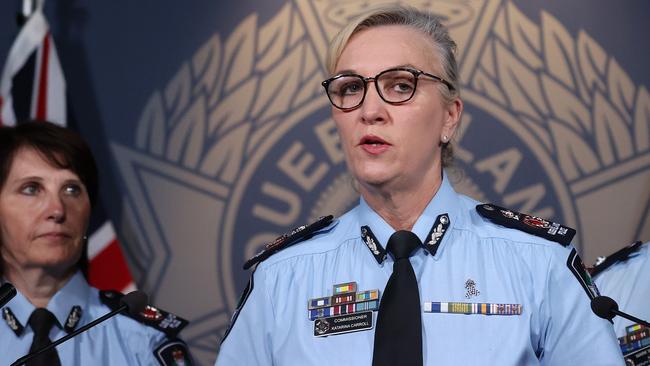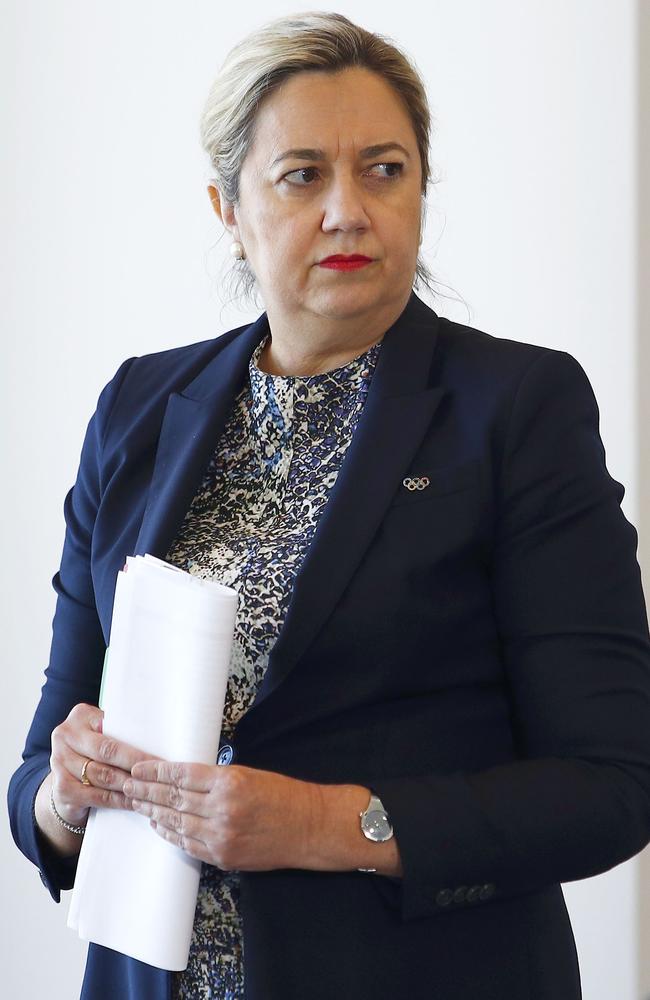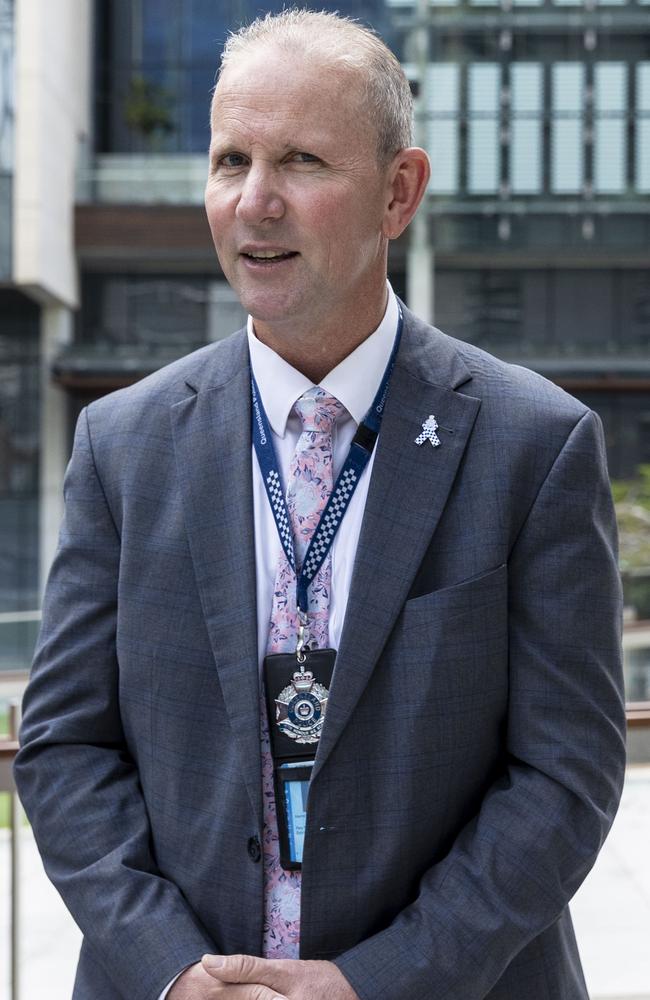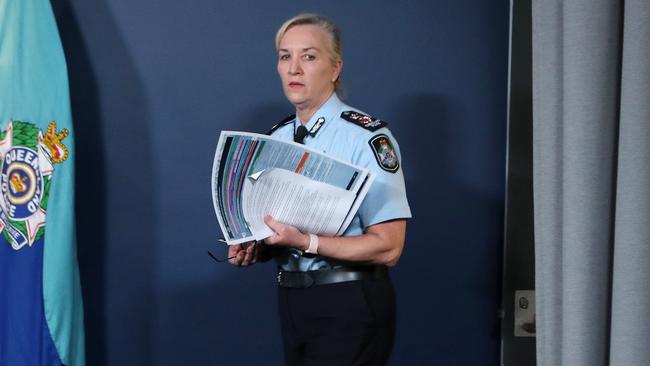DV inquiry report ‘like someone stabs you in the heart’, says Katarina Carroll
Police Commissioner Katarina Carroll has been thrown a lifeline by the Premier and can reset, the police union boss says.
Police & Courts
Don't miss out on the headlines from Police & Courts. Followed categories will be added to My News.
Police Commissioner Katarina Carroll said she considered resigning after a scathing 400-page report from a domestic violence inquiry repeatedly blamed a “failure in leadership” for a culture of sexism, racism and misogyny within the ranks.
Ms Carroll admitted “we have let people down” following five months of evidence that saw one of her deputies resign, a senior officer go on leave and horrific examples of police officers receiving little to no punishment for prolonged sexual harassment and bullying.
The report from the Commission of Inquiry into Queensland Police Service Responses to Domestic and Family Violence was yesterday made public, recommending 78 changes, including effectively putting an end to “police investigating police”.

It detailed how “burnt-out” police avoided responding to domestic violence calls for help, remarking “not another domestic” or rating victims on their looks and making jokes about the circumstances.
The inquiry found gaps in resourcing and training but also heard stories of “dedicated and caring” police who “protect victim-survivors of domestic and family violence as best they can”.
Among the major recommendations put forward by Commissioner of the Inquiry, Judge Deborah Richards, was the implementation of a civilian body within the Crime and Corruption Commission to investigate all complaints against police.
Deputy Commissioner Steve Gollschewski has also been appointed to the role of “Special Co-ordinator for Police Reform” to implement the recommendations and will report directly to the government.
The government will spend $100m to fund more specialist domestic violence police, embed more support workers in police stations and put on more victim liaison officers, domestic violence liaison officers and cultural liaison officers across Queensland.

There will also be a boost to resources within the DV Command after Ms Carroll was criticised for ignoring requests to properly staff the newly-formed unit.
Premier Annastacia Palaszczuk, who said the government would take on all 78 recommendations, was forced to repeatedly defend Ms Carroll, insisting that the problems within the service had not “just happened overnight” and that there was not a “more appropriate person to lead the reform than a strong woman”.
“I think you’ll also find that embedded throughout the report is years, if not decades, of examples of this type of misogyny, sexism, and racism,” Ms Palaszczuk said after being asked if Ms Carroll should resign.
“This has not just happened overnight. This report is confronting, it is disturbing, and I cannot think of a more appropriate person to lead the reform than a strong woman.”
Asked about whether there had been a failure of leadership, the Premier said: “The report clearly says that in some instances that there has been.
“The report does not make any recommendations about the leadership. The report sets up a path for reform.”

Asked repeatedly whether anyone would be held to account over the failures, she said: “I think they’re all accountable.”
Ms Carroll said it was one of the most difficult things she’d read.
“I agree that the people that we serve externally in these instances, as well as internally, have been let down,” she said.
“It’s very difficult to sit up here and acknowledge and know that our people say and have done terrible things.
“When I hear them come up, it’s like someone stabs you in the heart because you don’t want to hear any more.”
Asked whether resigning in order to give the service a “fresh start” had crossed her mind, Ms Caroll said: “It did cross my mind but the Premier is very firm with me … that I am the right person to lead this reform.”
Queensland Police Union president Ian Leavers said the Commissioner was “thrown a lifeline” and it was time for her to “get back to basics”.
“She can reset and get on with the job,” he said.

“This is the time for the police commissioner to regain the trust of police and step up and do the job that she is charged with doing,” he said.
The Commission of Inquiry received more than 400 submissions from victim-survivors around their experiences reporting domestic violence and received 365 submissions from current or former police employees.
The inquiry also heard days of evidence about police officers who had bullied, stalked, sexually assaulted and harassed colleagues but received little to no punishment for their conduct.
It heard the disciplinary process of “local managerial resolution” – a chat with a more senior officer – had been misused and had been applied to repeat and serious offenders.
The scathing report made repeated references to a failure in leadership resulting in major cultural issues which, in turn, affected how police respond to domestic violence.
“Despite the initial protestations of the Commissioner of Police and the president of the Police Union of Employees, the Commission has found clear evidence of a culture where attitudes of misogyny, sexism and racism are allowed to be expressed, and at times acted upon, largely unchecked,” the report said.
“Where complaints in relation to such treatment are brushed aside or dealt with in the most minor of ways and those who complain are the ones who are shunned and punished.
“It is hardly surprising that these attitudes are reflected then in the way that those police who hold them respond to victim-survivors.
“It is a failure of the leadership of the organisation that this situation has been allowed to continue over many years unchecked.”




